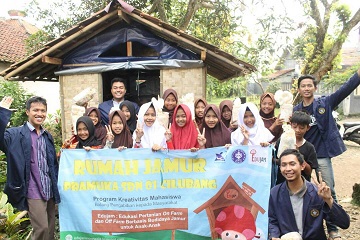Students of IPB Created the Agricultural Miniature Education for Children through Edujam

Indonesia today encountered a crisis in the agricultural sector. Young people preferred to find work in the city, while the employment was limited. The farmland in the village or in wide open areas was to be utilized. The existing human resources (HR) could not utilize the agricultural sector, if HR did not understand about the agriculture. The narrow knowledge of the youth-owned farming was now one of the reasons that spurred their aversions to work directly in the agriculture. While the agricultural sector became the important sector in the structure of the Indonesian economy.
The meaning of the agriculture was very broad indeed, not just the problems of fields and plantations alone. The agriculture in a broad sense included various aspects of the cultivation of crops, the plantations, the animal husbandry, the fisheries and the marine, and the forestry. Other than that, the agriculture was also not just about producing the agricultural commodities, but also studying various areas of the agricultural support such as the technology, the science, the economics, the socio-culture to the politics relating to the agriculture itself. This was better known by the term as the agriculture on farm and off farm. The agriculture on farm covered the agricultural activities in the field, and the agriculture off farm covered the postharvest activities and all agricultural support activities.
As the agricultural and maritime country, it was important for Indonesia to build a strong understanding and mindset to the nation and its young generation about the agriculture in the broad sense (Mubyarto 1983). Seeing the importance of it, Lutfi Ilham Pradipta (Lutfi) and four of his colleagues who came from the only agricultural campus in Indonesia conducted an educational movement focused on the Elementary School (SD). ”Childhood is a good time for the planting of the basic values and knowledge,” said Lutfi.
The educational movement was initiated by the students of the Faculty of Agricultural Technology (Fateta) focusing on the mushroom cultivation. The Agricultural Education on Farm and off Farm Based on the Mushroom Cultivation for Children was better known as Edujam. The reason for choosing the mushroom as a commodity used in this educational movement was because the fungus was easily treated and quickly harvested. This was deemed to be appropriate by Lutfi and the team to introduce the agriculture on farm and off farm to the children. The harvest period was not long to make the children quickly know and understand how to farm off farm.
In the Edujam, the children were not only taught about the process of growing the mushroom and its cultivation. They also would be guided on the post-harvest processing ranging from making the product to marketing it in a simple way first. The mushroom harvest period, such as the mushroom which was quite short, was approximately two weeks, so it was appropriate to be a miniature agricultural activity for children.
The Edujam activity was done in an Elementary School (SD) in the area of Bogor, namely SD 01 Cilubang. SD 01 Cilubang was selected as the location of the Edujam movement, because in the area of Cilubang itself many of its residents worked in the field of the wood saws. The cut wood scrap was the main ingredient in the manufacture of the mushroom growing media. So that, this was considered as the form of the resource optimization in the program of the Edujam. The next plan being designed by Lutfi and the team was to create a permanent mushroom house.(KHO/NM)



